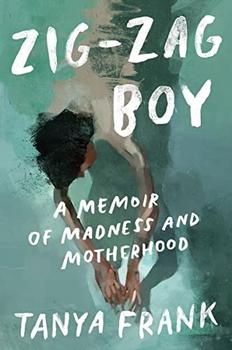Page 4 of 4
There are currently 26 member reviews
for Zig-Zag Boy
-
Peggy A. (Fairfax, VA)
ZIG-ZAG BOY
From the first page this book caught my interest and never let go.
Tanya Frank tells how exhausting the journey is for both patient and caregiver to live with mental illness on a daily basis.
I would recommend ZIG-ZAG BOY to anguish terestrd in mental illness.
-
Kelly S.
Compelling Read
For anyone who's been through the life changing consequences of dealing with a mental illness diagnosis in a family member, there is a lot to relate to in Zig Zag Boy. Tanya Frank has, in an easy to read style, given an intimate and honest account of the fear, guilt, sadness and exasperation she experiences in her search for answers in a "trial and error" health care system.
For anyone coping with any adversity, you'll find lessons here in the value of perseverance and of acceptance. You'll discover the benefits of being open to the support of a larger community. You'll also be reminded of the importance of nurturing close relationships and the necessity of finding peace and balance in your own life.
-
Stephanie S. (Driftwood, TX)
The Havoc of Psychosis
I found this book to be a heartbreakingly realistic tale of the havoc a mental illness diagnosis can have on a family. As the mother of a child on the autism spectrum, so many of the situations the author and her family experienced brought back memories, sad, scary, confusing and wonderful memories.
I am not, however, a fan of the author's writing style. At times the tale jumped from topic to topic and from minute detail to impossibly large generalizations in a single paragraph which was very distracting. There were also sweeping summaries at the end of a number of chapters which made me think I had reached the end of the book. Perhaps I should have read only a single chapter at each sitting. Once again, this was very distracting making the book seem disjointed.
I will recommend this book to the extended family of anyone who has psychosis in their family to provide a window into what their nuclear family may be experiencing.
-
Rebecca K. (Chicagoland)
New age-y response to serious mental illness
I wanted to like this book, but I couldn't get past some glaring issues. Though author Tanya Frank is telling the true story of her son's struggle with schizophrenia in his late teens/early 20s, she mentions only once or twice that she has certain privileges that are not afforded to most people. Many people living with this condition don't have the benefit of excellent health insurance and a ready supply of money to cover many costs that aren't covered by insurance. I lost count of how many houses the author has in various countries.
Additionally, I found it a bit new age/crunchy/woo-woo. This is a family with a chiropractor who makes house calls, bringing sage to cleanse their home of bad spirits. Tanya Frank wanted to find an agricultural commune-type setting for her son to live. She tried to find alternate treatments, including something called "orthomolecular medicine" which is basically just vitamins and supplements, for her son, who refused to take his prescribed medications. She wails about how group homes wouldn't allow him to stay, despite the fact that he refused medication, would not allow staff to enter his room, failed to clean after himself, and damaged the property. Is it really so surprising they'd rather give the space to someone who would stick with the program?
This book isn't what I expected & it would have been a DNF if I didn't have to write a review of it.
-
Terri K. (Houston, TX)
A promising topic, but a difficult read
I was excited to read this book because of the very real topic of parents dealing with a major psychiatric illness in their adult child.
However, I found this book to be a disappointment. The writing is quite labored and is difficult to settle into. I found it to be overly dramatic, but not at the places where true drama is presented. Every part of the book was over the top, including parts where a lighter hand could have been effective.
The author begins this journey with clear personal points of view (e.g., pharmaceutical treatments). While part of her own journey, it would have been more interesting to discuss the rationale for her position. I am not saying that she is incorrect for her situation, but I think the memoir would have more breadth if we knew the author's motivation and underlying thinking as she goes through a difficult situation.
